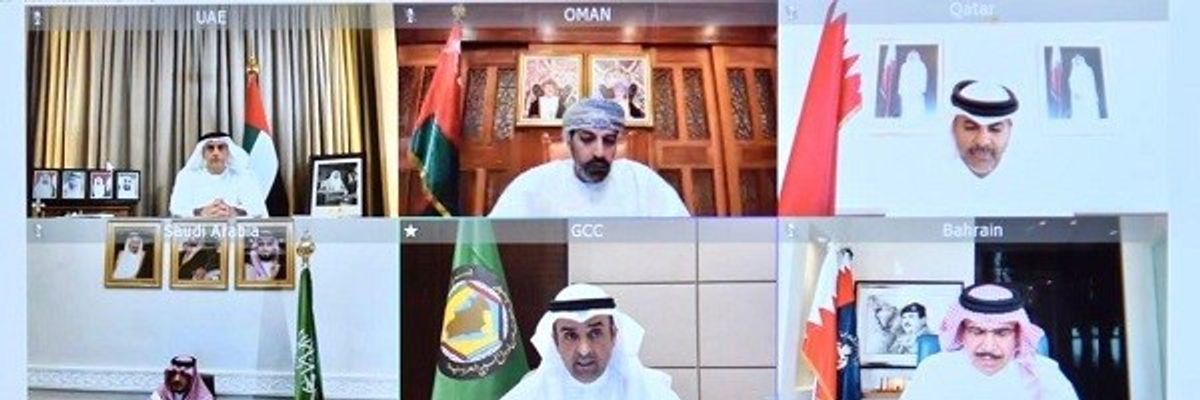Since the Gulf crisis erupted in mid-2017, talks aimed at pushing the so-called Anti-Terror Quartet (ATQ)—made up of Bahrain, Egypt, Saudi Arabia, and the United Arab Emirates (UAE)—and Qatar toward reconciliation have proved futile. At the beginning of this year, most experts agreed that the prospects for renormalization of relations between the blockading states and Doha were dim. Yet amid the global coronavirus (a.k.a. COVID-19) pandemic, it is fair to ask whether this crisis could be a game-changer that pushes the two sides toward rapprochement.
Earlier this month, Qatar’s prime minister and minister of the interior attended a virtual Gulf Cooperation Council (GCC) emergency meeting. At the risk of reading too much into this occasion, it suggested that the different parties in this nearly three-year-old Arabian feud were willing to, at least temporarily, put their differences and political problems with each other on the back burner in order to improve transnational efforts to cope with COVID-19. As May Nasrallah, the founder and executive chairman of deNovo Corporate Advisors, recently asserted, this global pandemic “extends an olive branch” in the GCC because all six member-states of the sub-regional institution have shared interests in curbing the spread of the virus.
While it is true that resolving the GCC crisis could help the Gulf region and, by extension, the greater Middle East and world at large deal with COVID-19, in practice it may not be so simple. In fact, there is much to be said about coronavirus and its potential to exacerbate the ATQ-Qatar rift. For example, there have been countless social media posts accusing Qatari authorities of “bringing the coronavirus to the region.”
As the Los Angeles Times reported, many of these incendiary posts came from Saudi, Emirati, and Egyptian marketing firms. There is no doubt that such information warfare amid the COVID-19 pandemic only serves to fuel greater distrust between the two sides of the GCC crisis rather than rebuild bridges of confidence that would be essential for reconciliation between Qatar and the Saudi/UAE axis. Such attacks highlight the depth and extent of the GCC’s disunity.
It is still too early to tell how the COVID-19 pandemic, which recognizes no national boundaries or any ideological or tribal dispute, will impact the Gulf region’s geopolitical landscape. Although coronavirus is fueling (mis)information warfare in the GCC, one should also consider reasons to be optimistic about reconciliation if the pandemic can give the blockading states a new face-saving way to lift, or at least ease, their blockade of Qatar.
Since the coronavirus outbreak, actions by Abu Dhabi and Riyadh suggest that both capitals see the pandemic as a reason, or at least a pretext, for making some foreign policy adjustments that could bode well for future openings of dialogue between regional adversaries. For example, the UAE, despite being a traditional foe of the Islamic Republic of Iran, has stepped up as a country playing a critical role in terms of helping Tehran deal with COVID-19. Also, earlier this month, Saudi Arabia announced a unilateral ceasefire in its war against Yemen’s Houthi rebels as the Kingdom grapples with the challenge posed by the virus to its economic interests.
Cinzia Bianco, a senior advisor at Gulf State Analytics, emphasized that GCC members “want to prove that they are also active players in humanitarian cooperation with their enemies.” If this thinking prevails throughout all Arab Gulf capitals, there remains the possibility that COVID-19 could become the catalyst that prompts the renormalization of ATQ-Qatar relations. History has shown that GCC member-states move closer together in times of international/regional crises, even if major underlying differences between them persist. Just as the meteoric rise of Islamic State (ISIS or IS) in 2014 contributed to the resolution of that year’s GCC diplomatic spat, the global pandemic that has thus far resulted in more than 100,000 deaths could be another crisis that prompts all the Arabian monarchies to make GCC unity a higher priority than settling scores over ideological and tribal disputes. And given the UAE’s gestures toward Tehran, is it too much to hope for a larger regional détente that would bode well for longer-term stability in the Middle East, even after the development of a vaccine for coronavirus?
As May Nasrallah said, at this juncture, “everybody needs everybody else” in the Gulf region.
















